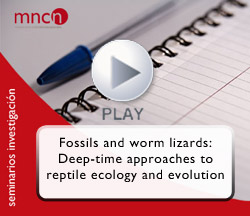Fossils and worm lizards: Deep-time approaches to reptile ecology and evolution. Johannes Müller Museo de Berlín Alemania.
Título: Fossils and worm lizards: Deep-time approaches to reptile ecology and evolution
Ponente: Johannes Müller, Museo de Berlín, Alemania.
Resumen:
Our understanding of today’s biodiversity rests to a significant extent on reconstructions of historical patterns of phylogeny, biogeography, and character evolution. However, there is a strong mismatch between how the past is reconstructed from exclusively neontological data and how direct evidence from the past, i.e. information from paleontology, is taken into account. For instance, the estimation of evolutionary rates of diversification, historical biogeography, the evolution of ecological traits, and conceptual issues such as niche conservatism may greatly benefit from approaches that integrate both present and deep time. In my talk I will present examples from our own research on squamate reptiles, in which we combine information from the fossil record and studies on extant taxa to investigate the ecology and evolution of this clade from a multi-layered perspective. I will particularly focus on the burrowing amphisbaenians and their relatives, which represent a fascinating model system to address several important issues such as the evolution of novel morphologies, ecological conservatism, and the importance of fossils for the understanding of modern biodiversity.
Seminario disponible en Cienciatk






